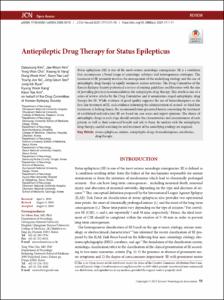Antiepileptic Drug Therapy for Status Epilepticus
- Keimyung Author(s)
- Cho, Yong Won; Kim, Keun Tae
- Department
- Dept. of Neurology (신경과학)
- Journal Title
- Journal of Clinical Neurology
- Issued Date
- 2021
- Volume
- 17
- Issue
- 1
- Keyword
- status epilepticus; seizure; antiepileptic drugs; benzodiazepines; anesthetics; drug therapy
- Abstract
- Status epilepticus (SE) is one of the most serious neurologic emergencies. SE is a condition that encompasses a broad range of semiologic subtypes and heterogeneous etiologies. The treatment of SE primarily involves the management of the underlying etiology and the use of antiepileptic drug therapy to rapidly terminate seizure activities. The Drug Committee of the Korean Epilepsy Society performed a review of existing guidelines and literature with the aim of providing practical recommendations for antiepileptic drug therapy. This article is one of a series of review articles by the Drug Committee and it summarizes staged antiepileptic drug therapy for SE. While evidence of good quality supports the use of benzodiazepines as the first-line treatment of SE, such evidence informing the administration of second- or third-line treatments is lacking; hence, the recommendations presented herein concerning the treatment of established and refractory SE are based on case series and expert opinions. The choice of antiepileptic drugs in each stage should consider the characteristics and circumstances of each patient, as well as their estimated benefit and risk to them. In tandem with the antiepileptic drug therapy, careful searching for and treatment of the underlying etiology are required.
- Publisher
- School of Medicine (의과대학)
- Citation
- Daeyoung Kim et al. (2021). Antiepileptic Drug Therapy for Status Epilepticus. Journal of Clinical Neurology, 17(1), 11–19. doi: 10.3988/jcn.2021.17.1.11
- Type
- Article
- ISSN
- 2005-5013
- Source
- https://www.thejcn.com/search.php?where=aview&id=10.3988/jcn.2021.17.1.11&code=0145JCN&vmode=FULL
- Appears in Collections:
- 1. School of Medicine (의과대학) > Dept. of Neurology (신경과학)
- 파일 목록
-
-
Download
 oak-2021-0014.pdf
기타 데이터 / 347.61 kB / Adobe PDF
oak-2021-0014.pdf
기타 데이터 / 347.61 kB / Adobe PDF
-
Items in Repository are protected by copyright, with all rights reserved, unless otherwise indicated.